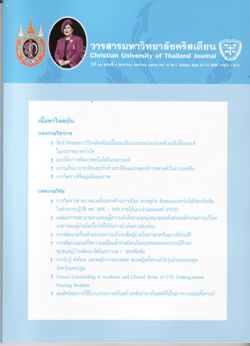The Outcomes of Empowerment Program in Individuals with Gestational Diabetes Mellitus
Abstract
Gestational diabetes mellitus (GDM) is a major public health problem. The Ministry of Health recognizes the important and attention. Because GDM is a danger to pregnant and fetus. The incidence of GDM in the percentage of the population of Thailand is 2-3 percent. In Sampran Hospital pregnant with diabetes between 2550 -2554, AD. was increasing and pose a health problem to pregnants and fetus. The empowerment program can prevent the effects of diabetes while pregnant. The objective of this study was to study the results of the empowerment program in pregnant with diabetes. The sample consisted of 60 pregnant with diabetes, who underwent antenatal clinic.in Sampran Hospital. Nakhon Pathom province. Among all 60 samples, it was convenience devided into two groups. The first 30 pregnants who were selected to the control group received usual care and the later 30 patients who were experimental group who received the empowerment program, which based on the concept of Gibson (Gibson, 1991) and Orem's self care. Data were collected during October 2554 to May 2555.Both groups were assessed the knowledge of self and their ability to care for diabetes during pregnancy. All samples were strictly protected based on human right standard. Data analysis by descriptive statistics, and the average values were compared by Independent t - test.
The results showed that both groups were similar in demographic characteristics and socio-economic conditions. After the empowerment program, pregnant women with diabetes during pregnancy had an average blood sugar levels under control. Mean scores in self-care in pregnant with diabetes during pregnancy who underwent the empowerment program were higher than the control group was statistically significant at the 0.05 level. This study confirmed that a program of the empowerment in pregnant with diabetes during pregnancy is effective. whieh the pregnant woman gain much more knowledge to take care of themselves, improve capable of self care and lastly well control of blood sugar level.
From this study researchers have suggested that nurses in antenatal clinic should adopt a program of the empowerment as a part of antenatal care to improve better quality of life for pregnant women with diabetes during pregnancy.
References
กาญจนา ปัญญาธร. (2551). การศึกษาเปรียบเทียบ ผู้ป่วยเบาหวานที่มีปัญหาในการควบคุมระดับน้ำตาลในเลือดและผู้ที่สามารถควบคุมระดับน้ำตาลในเลือดได้ดี ตำบลเชียงยืน อำเภอเมือง จังหวัดอุดรธานี. ผลงานวิชาการ. วิทยาลัยพยาบาลบรมราชชนนีอุดรธานี จังหวัดอุดรธานี.
กองสถิติ กระทรวงสาธารณสุข. (2553). สถิติสาธารณสุข. นนทบุรี : สำนักนโยบายและยุทธศาสตร์.
งานส่งเสริมสุขภาพ. (2554). ข้อมูลอนามัยแม่และเด็ก. สำนักงานสาธารณสุขจังหวัดนครปฐม. นครปฐม.
นุชปิยา เต็มภาชนะ. (2553). ผลของโปรแกรมการป้องกันเบาหวานในผู้มีภาวะเบาหวานแฝง โรงพยาบาล สมเด็จพระปิ่นเกล้า. วิทยานิพนธ์พยาบาลศาสตรมหาบัณฑิต, มหาวิทยาลัยคริสเตียน.
บุญใจ ศรีสถิตย์นรากูล. (2553). ระเบียบวิธีการวิจัยทางการพยาบาล. พิมพ์ครั้งที่ 5 กรุงเทพมหานคร. บริษัท ยูแอนไอ อินเตอร์มีเดีย จำกัด.
บุษกร อ่อนโนน. (2547). ผลของการการสร้างพลังอำนาจแบบกลุ่มต่อความสามารถในการดูแลตนเองของผู้ป่วยเบาหวาน. วิทยานิพนธ์พยาบาลศาสตรมหาบัณฑิต สาขาวิชาการพยาบาลผู้ใหญ่, บัณฑิตวิทาลัย มหาวิทยาลัยเชียงใหม่.
เยื้อน ตันนิรันดร และคณะ. (2551). เวชศาสตร์มารดาและทารกในครรภ์. พิมพ์ครั้งที่ 2. กรุงเทพฯ.ราชวิทยาลัยสูตินรีแพทย์แห่งประเทศไทย.
วัลลา ตันตโยทัย. (2540). รูปแบบการพัฒนาศักยภาพในการดูแลตนเองของผู้ป่วยโรคเบาหวานชนิดพึ่งอินซูลิน. วิทยานิพนธ์พยาบาลศาสตรดุษฎีบัณฑิต, บัณฑิตวิทยาลัย มหาวิทยาลัยมหิดล.
อรทิพย์ เอ่งฉ้วน. (2549). ผลของโปรแกรมการส่งเสริมสุขภาพต่อระดับน้ำตาลเกาะเม็ดเลือดแดงในผู้ป่วยเบาหวานชนิดที่ 2. วิทยานิพนธ์พยาบาลศาสตรมหาบัณฑิต, จุฬาลงกรณ์มหาวิทยาลัย.
อุษา ทัศนวิน. (2553). ผลของการเข้าค่ายเบาหวานกลางวันต่อการรับรู้สมรรถนะแห่งตน พฤติกรรมการดูแลตนเองและระดับน้ำตาลในเลือดของผู้ป่วยโรคเบาหวาน ชนิดที่ 2. วารสารสภาการพยาบาล, 25(1) : 53-66.
Amos, A.F., Mc, Carty D.J., & Zimmet, P. (1997). The rising global burden of diabetes and its complications: estimates and projections to the year 2010. Diabet Med. 14 (5) : S1-85.
Gibson CH. (1991). A concept analysis of empowerment. Journal of Advanced Nursing. 16(3) : 354-361
________ (1995). The process of empowerment in mothers of chronically ill children. Journal of Advanced Nursing. 21(6) : 1201-1210.
Kim, C., Mc Ewen, L.N.,Kieffer,E.C., Herman, W.H., Piette, J.D. (2008). Self-efficacy, social support, and associations with physical activity and body mass index among women with histories of gestational diabetes mellitus. Diabetes Educ. 2008 Jul-Aug; 34(4) : 719-28.
Orem, D.E. (1995). Nursing : Concepts of Practice. St.Louis : Mosby Year Book.
Orem, D.E., Taylor, S.G., Renpenning, K.M. (2001). Nursing : Concepts of Practice. St.Louis: Mosby Year Book.
Shi, Q., Ostwald, S.K. and Wang, S. (2009). Improving glycaemic control self-efficacy and glycaemic control behaviour in Chinese patients with type 2 diabetes mellitus : randomised controlled trial. Journal of Clinical Nursing. 19(3-4), 398-404.



